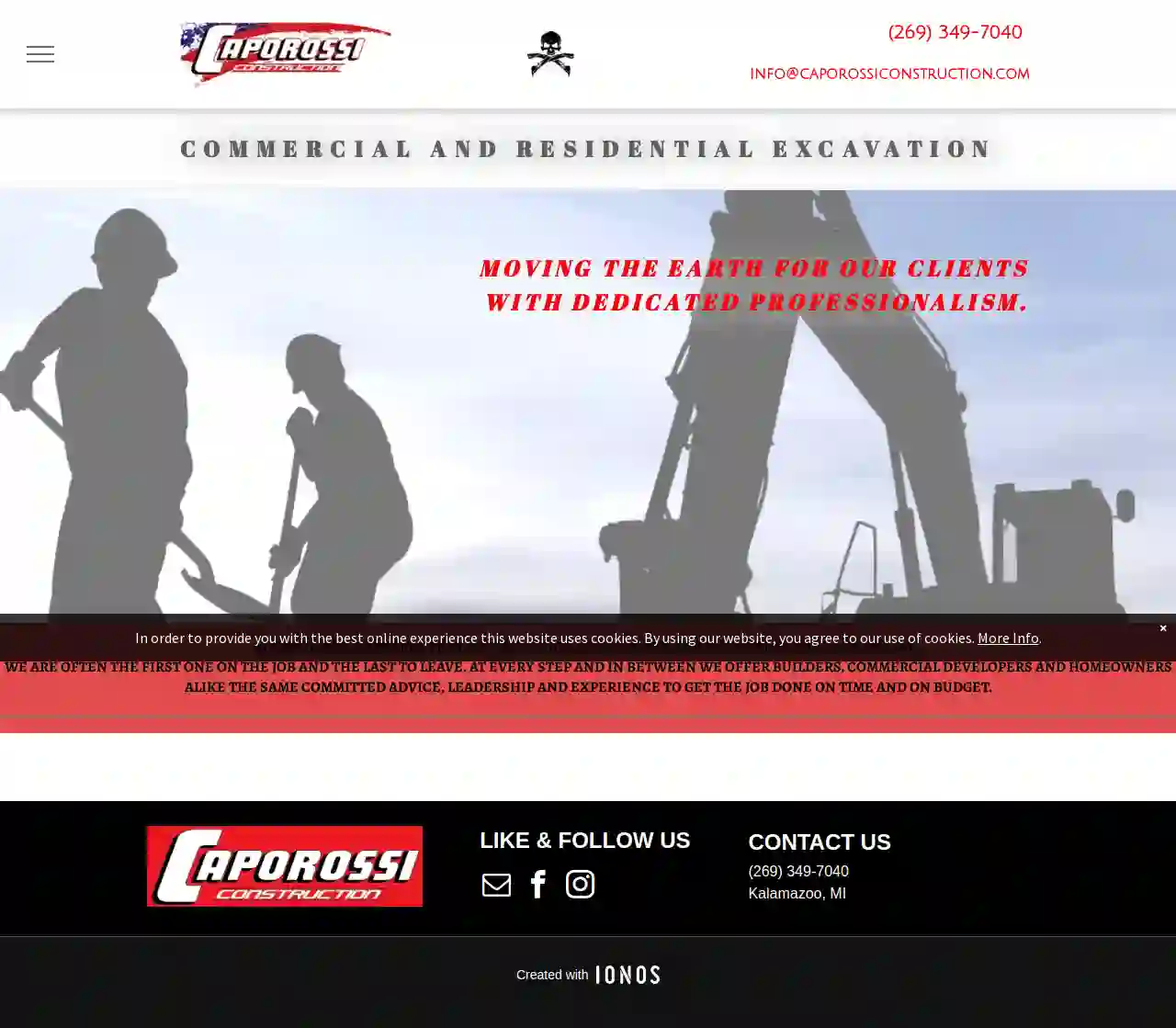Demolition Contractors Kalamazoo
Find the best Demo Contractor in Kalamazoo
Get multiple Structure Demolition quotes for your project today! Compare profiles, reviews, accreditations, portfolio, etc... and choose the best deal.

Advanced Landworx
517 reviewsKalamazoo, USAdvanced Landworx is a West Michigan-based company that offers a variety of services, including excavation, grading, mulching, land clearing, environmental services, dumpster rental, underground utilities, material delivery, snow removal, landscape design, maintenance, and installation, as well as property maintenance. With over 15 years of experience in the industry, owner Zackariah Turks and his team are dedicated to providing top-notch services to their clients. Their commitment to precision, attention to detail, and customer satisfaction sets them apart from the rest.
- Services
- Why Us?
- Our Team
- Testimonials
- Gallery
Get Quote
Caporossi Construction
4.38 reviews123 Main St, Kalamazoo, MI, 49001, USCaporossi Construction is a professional excavation and construction company that offers a wide range of services including earth moving, utility services, hauling and trucking, demolition, and road construction. With a focus on dedicated professionalism, they aim to provide every service with a smile and to the highest level of satisfaction. Their team is equipped with the latest equipment and technology, ready to help complete projects on time and on budget.
- Services
- Why Us?
- Accreditations
- Our Team
- Testimonials
- Gallery
Get Quote
Over 8,858+ Demolition Contractors on our platform
Our demolition contractors operate in Kalamazoo & surroundings!
DemolitionMatch has curated and vetted Top Demolition Businesses in and around Kalamazoo. Find a top & trustworthy contractor today.
Frequently Asked Questions About Demolition Contractors
- Obtaining Permits: Securing all necessary permits and approvals before commencing demolition.
- Compliance with Codes and Regulations: Adhering to building codes, environmental regulations, and safety standards during all demolition activities.
- Worker Safety: Providing a safe working environment for their employees and complying with occupational safety regulations.
- Waste Management: Properly handling, transporting, and disposing of demolition debris in accordance with environmental laws.
- Public Safety: Taking measures to protect the public from any hazards associated with the demolition.
- Insurance and Bonding: Maintaining adequate insurance coverage and surety bonds to protect against potential liabilities.
- Experience: 'How long have you been in business, and what experience do you have with similar demolition projects?'
- Licensing and Insurance: 'Can you provide proof of your licenses and insurance coverage?'
- Safety Record: 'What are your safety protocols and training procedures for your workers?'
- Demolition Method: 'What demolition method do you recommend for my project, and why?'
- Project Timeline: 'What is the estimated timeframe for completing the demolition, including debris removal?'
- Cost Breakdown: 'Can you provide a detailed breakdown of the costs involved in the demolition?'
- Permits and Approvals: 'Will you be handling the acquisition of necessary permits and approvals?'
- Waste Management: 'How will you handle the removal and disposal of demolition debris? Do you offer recycling options?'
- References: 'Can you provide references from past clients who have had similar demolition projects?'
- Waste Management: Proper handling, sorting, and disposal of demolition debris to minimize landfill waste.
- Recycling: Maximizing the recycling of materials like concrete, steel, wood, and other salvageable components.
- Hazardous Materials: Safe removal and disposal of hazardous materials in accordance with environmental regulations.
- Dust and Noise Control: Implementing measures to minimize dust and noise pollution during demolition.
- Erosion Control: Preventing soil erosion and sedimentation runoff.
- Site Security:
- Personal Protective Equipment (PPE):
- Dust Control:
- Noise Control:
- Hazard Identification and Mitigation:
- Emergency Response Planning:
- Regular Safety Training for Workers:
What are the legal responsibilities of a demolition contractor?
What questions should I ask a demolition contractor?
What are the environmental considerations during demolition?
What are the safety precautions taken during demolition?
What are the legal responsibilities of a demolition contractor?
- Obtaining Permits: Securing all necessary permits and approvals before commencing demolition.
- Compliance with Codes and Regulations: Adhering to building codes, environmental regulations, and safety standards during all demolition activities.
- Worker Safety: Providing a safe working environment for their employees and complying with occupational safety regulations.
- Waste Management: Properly handling, transporting, and disposing of demolition debris in accordance with environmental laws.
- Public Safety: Taking measures to protect the public from any hazards associated with the demolition.
- Insurance and Bonding: Maintaining adequate insurance coverage and surety bonds to protect against potential liabilities.
What questions should I ask a demolition contractor?
- Experience: 'How long have you been in business, and what experience do you have with similar demolition projects?'
- Licensing and Insurance: 'Can you provide proof of your licenses and insurance coverage?'
- Safety Record: 'What are your safety protocols and training procedures for your workers?'
- Demolition Method: 'What demolition method do you recommend for my project, and why?'
- Project Timeline: 'What is the estimated timeframe for completing the demolition, including debris removal?'
- Cost Breakdown: 'Can you provide a detailed breakdown of the costs involved in the demolition?'
- Permits and Approvals: 'Will you be handling the acquisition of necessary permits and approvals?'
- Waste Management: 'How will you handle the removal and disposal of demolition debris? Do you offer recycling options?'
- References: 'Can you provide references from past clients who have had similar demolition projects?'
What are the environmental considerations during demolition?
- Waste Management: Proper handling, sorting, and disposal of demolition debris to minimize landfill waste.
- Recycling: Maximizing the recycling of materials like concrete, steel, wood, and other salvageable components.
- Hazardous Materials: Safe removal and disposal of hazardous materials in accordance with environmental regulations.
- Dust and Noise Control: Implementing measures to minimize dust and noise pollution during demolition.
- Erosion Control: Preventing soil erosion and sedimentation runoff.
What are the safety precautions taken during demolition?
- Site Security:
- Personal Protective Equipment (PPE):
- Dust Control:
- Noise Control:
- Hazard Identification and Mitigation:
- Emergency Response Planning:
- Regular Safety Training for Workers: